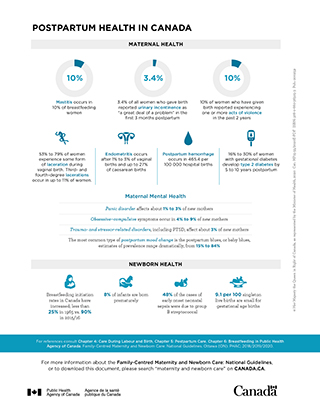Chapter 5 Infographic: Postpartum Health in Canada

Download in PDF format
(113 KB, 1 page)
Organization: Public Health Agency of Canada
Date published: 2024-08-01
Maternal Health
- Mastitis occurs in 10% of breastfeeding women
- 3.4% of all women who gave birth reported urinary incontinence as “a great deal of a problem” in the first 3 months postpartum
- 10% women who have given birth reported experiencing one or more acts of violence in the past 2 years
- 53% to 79% of women experience some form of laceration during vaginal birth. Third- and fourth-degree lacerations occur in up to 11% of women
- Endometritis occurs after 1% to 3% of vaginal births and up to 27% of caesarean births
- Postpartum hemorrhage is estimated to occur in 5-6% of hospital births in Canada
- 16% to 30% of women with gestational diabetes develop type 2 diabetes by 5 to 10 years postpartum
Maternal Mental Health
- Panic disorder affects about 1% to 3% of new mothers
- Obsessive–compulsive symptoms occur in 4% to 9% of new mothers
- Trauma- and stressor-related disorders, including PTSD, affect about 3% of new mothers
- The most common type of postpartum mood change is the postpartum blues, or baby blues. Estimates of prevalence range dramatically, from 15% to 84%
Newborn Health
- Breastfeeding initiation rates in Canada have increased; less than 25% in 1965 vs. 90% in 2015/16
- 8% of infants are born prematurely
- 48% of the cases of early onset neonatal sepsis were due to group B streptococcal
- 9.1 per 100 singleton live births are small for gestational age births
For references, consult Chapter 4: Care During Labour and Birth, Chapter 5: Postpartum Care, Chapter 6: Breastfeeding in Public Health Agency of Canada. Family-Centred Maternity and Newborn Care: National Guidelines. Ottawa (ON): PHAC; 2020.